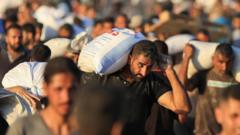The ongoing tension in Gaza reflects deepening humanitarian crises, with calls for a ceasefire and urgent aid amid the conflict.
**Hamas Stands Firm on Disarmament Stance Amid Ceasefire Talks With Israel**

**Hamas Stands Firm on Disarmament Stance Amid Ceasefire Talks With Israel**
Hamas declares disarmament contingent on establishing a Palestinian state, amidst rising international pressure.
Hamas has reiterated its stance on disarmament, asserting it will not relinquish its arms until a sovereign Palestinian state is established. This position is a direct response to recent statements attributed to Steve Witkoff, the U.S. envoy to the Middle East, who suggested that Hamas had expressed a willingness to disarm. The Israeli government has identified the disarmament of Hamas as a crucial demand in the pursuit of a ceasefire agreement.
In the past week, negotiations between Israel and Hamas aimed at securing a ceasefire and the release of hostages have reached a standstill. The armed group faces increasing calls from Arab nations to surrender its weapons and relinquish control over Gaza, particularly after several Western nations, including Canada and France, signaled plans to recognize a Palestinian state. The UK has indicated it would follow suit if Israel fails to meet specific conditions by September.
In its statement, Hamas asserted that it is unwilling to yield its rights to resistance or disarm unless an "independent, fully sovereign Palestinian state with Jerusalem as its capital" is established. The Israeli Defense Forces (IDF) have warned that without swift progress on hostage negotiations, military action in Gaza would continue unabated.
The families of hostages, such as Evyatar David and Omri Miran, have voiced their concerns over their loved ones' welfare, especially following the release of distressing evidence by Hamas. On social media, footage of David being visibly malnourished sparked outrage, prompting appeals to the Israeli government and the U.S. for action.
As negotiations proceed, Witkoff has been actively engaging with both the Israeli government and families of hostages to advocate for peace and a focus on immediate resolutions to the conflict. His visit comes amid escalating warnings from UN agencies regarding severe humanitarian crises in Gaza, where the impact of the ongoing conflict has led to alarming rates of malnutrition and starvation.
In response to this situation, the Israeli military maintains that it does not intentionally target civilians, attributing chaos near humanitarian sites to Hamas provocations. The toll of the conflict has been devastating; according to reports from the Hamas-run health ministry, over 60,000 people have been killed in Gaza due to the Israeli offensive initiated following a deadly Hamas attack on October 7, which resulted in 1,200 deaths and hostage circumstances.
This ongoing saga of violence, negotiations, and humanitarian crises underscores the complexity of the Israeli-Palestinian conflict and the urgent need for a peaceful resolution that addresses the intricate political and social realities at play.
In the past week, negotiations between Israel and Hamas aimed at securing a ceasefire and the release of hostages have reached a standstill. The armed group faces increasing calls from Arab nations to surrender its weapons and relinquish control over Gaza, particularly after several Western nations, including Canada and France, signaled plans to recognize a Palestinian state. The UK has indicated it would follow suit if Israel fails to meet specific conditions by September.
In its statement, Hamas asserted that it is unwilling to yield its rights to resistance or disarm unless an "independent, fully sovereign Palestinian state with Jerusalem as its capital" is established. The Israeli Defense Forces (IDF) have warned that without swift progress on hostage negotiations, military action in Gaza would continue unabated.
The families of hostages, such as Evyatar David and Omri Miran, have voiced their concerns over their loved ones' welfare, especially following the release of distressing evidence by Hamas. On social media, footage of David being visibly malnourished sparked outrage, prompting appeals to the Israeli government and the U.S. for action.
As negotiations proceed, Witkoff has been actively engaging with both the Israeli government and families of hostages to advocate for peace and a focus on immediate resolutions to the conflict. His visit comes amid escalating warnings from UN agencies regarding severe humanitarian crises in Gaza, where the impact of the ongoing conflict has led to alarming rates of malnutrition and starvation.
In response to this situation, the Israeli military maintains that it does not intentionally target civilians, attributing chaos near humanitarian sites to Hamas provocations. The toll of the conflict has been devastating; according to reports from the Hamas-run health ministry, over 60,000 people have been killed in Gaza due to the Israeli offensive initiated following a deadly Hamas attack on October 7, which resulted in 1,200 deaths and hostage circumstances.
This ongoing saga of violence, negotiations, and humanitarian crises underscores the complexity of the Israeli-Palestinian conflict and the urgent need for a peaceful resolution that addresses the intricate political and social realities at play.

















